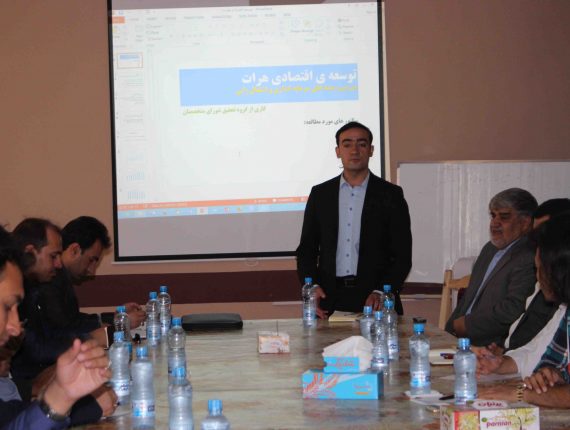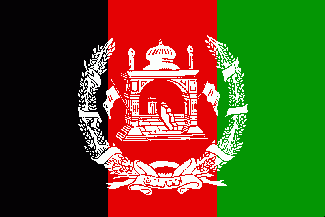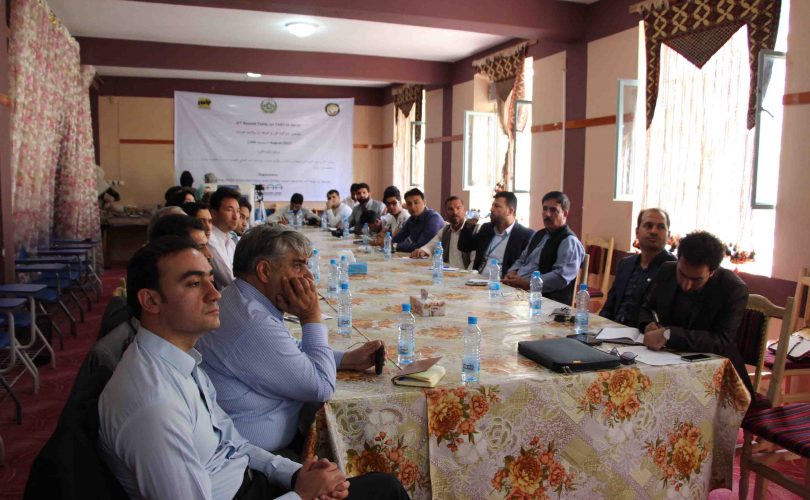Thursday, 24 August 2017
Today (Thursday), OSAA in coordination with Herat Department of Labor and Social Affairs/DoLSA and in cooperation with Help INGO organized a one-day second TVET Round-Table in Women Cooperative Conference Hall – Herat city. The main agenda for the second TVET Round-Table was presentation of the “findings of the research book (published in July by Herat Council of Experts) on Herat investment and employment opportunities”.
Several high-ranking officials including Mr. Afghan- DoLSA Director, Mr. Shaheer – Head of Herat Council of Experts, Zabihullah Monib Taheri – Help’s Country Director for Afghanistan, Mr. Yari – Deputy of Craftsmen Union and representatives of DoLSA, Chamber of Industries, Herat University, Behzad Art Institute, Herat Agriculture Institute, representatives of WFP, UNICEF, UNHCR, World vision, PIN, DRC, NRC, Afghan-Iran VTC, SOACS, OSAA, Help, and CSOs attended the round table meeting.
At the beginning, Mr. Mohammad Ali Soroosh – Program officer of Help, welcomed all participants, reviewed previous meeting highlights, and elaborated on the most important objectives set for the Round-Table meeting.He mentioned following four objectives as main reasons why TVET Round Table has been initiated:Establishing a TVET Stakeholders Network connecting I/NGOs, relevant Govt. Depts., private sector and CSOs together in order to facilitate coordination and cooperation in TVET related issues;
Buildup / seek government support for TVET programs and put it as one of the priority agenda of the Afghan government; Involve and encourage CSOs and private sector to contribute to TVET promotion, market-based training orientation and employment; and Guarantee sustainable government and private sector financial support for TVET programs.
After that, according to the agenda, Mr. Afghan, Head of Herat DoLSA discussed the importance of TVET as a window to employment and a solution for unemployment with high level of effectiveness in Afghanistan, especially in Herat. He mentioned that lack of training has disqualified Afghan labors in national and regional labor markets. He added that he has signed some 17 work-permit for foreign labors this month alone. He wished these foreign labors to be replaced by Afghan labors – well-trained in TVET programs. Mr. Afghan also mentioned that he has proposed to the Ministry of Labor and Social Affairs of Afghanistan to slowly take over the responsibilities of VTCs currently run by I/NGOs. According to him, Acting Minister has welcomed the idea and has promised to support pending further discussions.

In addition, Head of Herat DoLSA talked about the importance of research in enriching vocational trainings. He acknowledged that the government should encourage organizations to have such researches and use the findings to improve trainings and employment in Afghanistan.
Consequently, Mr. Nasir Ahmad Farahmand, Associate Professor and Researcher presented first part of the findings of the research book. He explained that overall goal of the research was identification and introduction of suitable investment platforms in Herat. He focused on investment and job-creation platforms in 3 sectors; Industry, Services and agriculture. Introduction of the most profitable industries, services and agricultural related vocations for investment, the challenges of investment and investors in Herat and some major issues on Afghanistan economy were discussed in details.
Following that, Mr. Ali Ahmad Kaveh, Associate Professor and researcher continued the second part of presentation on the findings of the research. Challenges and problems towards development of Herat and suggestions to improve investment potentials was also discussed. He also stated importance of government support for the development of industries, services quality and agriculture development in Herat. Mr. Soroosh said that group work will be the next TVET roundtable agenda. It is expected that through group work in the next round table, participants find ways through which government financial support could be secured for TVET trainings.
Mr. Mohammad Rafiq Shaheer, Head of Council of Experts, concluded the roundtable meeting. He said that findings of this research will help organizations working in the field of TVET to have a better and clearer view on training, orientation of vocational training and investment capacity. Copies of the book were distributed to the participants by Council of Experts.
Source: Help Media And Culture Department




